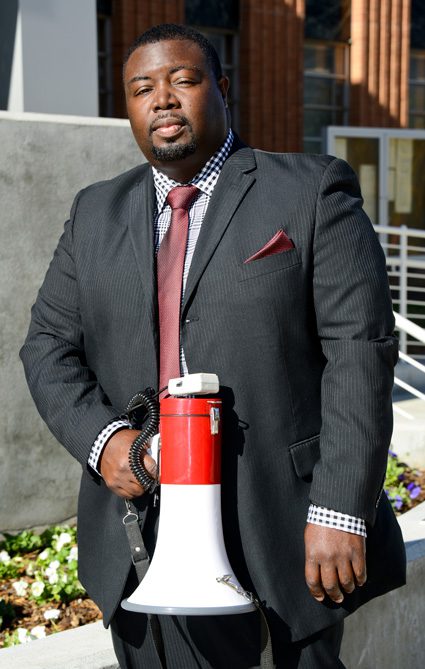
Marq Lewis
While he sat in a Tulsa restaurant on the night of the shooting death of Eric Harris, Marq Lewis thought long and hard about organizing protests. There was, again, another unarmed black man laying in the Tulsa streets, this time shot by a reserve sheriff deputy. But these protests, he felt, were jobs for community leaders. At the time, he didn’t know he was that community leader.
“I got phone calls from my people. They were saying that we needed to start protesting. I said, ‘No, no, no, let community leaders do it.’ They kept calling. Finally, someone asked me, ‘When was the last time national media was in Tulsa?’ It clicked with me, and we had protests up and running within 24 hours,” he says.
Over the next few months, those protests grew in size and number. They also grew in scope as Lewis’s grassroots organization, We the People Oklahoma, unearthed evidence of widespread corruption in Tulsa County Sheriff Stanley Glanz’s department and peeled back the layers of a culture that made the shooting possible.
Unlike Ferguson, Mo., and other cities that experienced similar incidents, Tulsa didn’t explode in violence. Civic leaders and protestors credit Lewis for that. His positive message, a mix of peaceful protest with firm demands for change, set the tone for rallies and marches across the city.
“Sometimes you have to lay down narratives of acceptance and come in peace. When we look at many great warriors over the last century, we see that their accomplishments were done in peace. Dr. King did it in peace. A lot of people, they’ve done that nonviolently, and they’ve gotten their message across. Mother Theresa did it in peace. They appealed to the humanity of people,” he says.
Tulsa is the “adopted home” of the 40-year-old videographer and photographer. After a job relocation from the East Coast, the company he worked for downsized. He was given a choice: move to Denver or be laid off. He decided to stick with Tulsa, wasting no time learning its history, culture and politics.
Lewis credits his grandmother and his father for his deeply ingrained sense of social justice. His disabled grandmother successfully lobbied the federal government for handicapped access to her apartment building. His father, a pastor, was regularly involved in pushes for justice. In high school he was introduced to the works of Dr. Martin Luther King, Jr. and other purveyors of civil disobedience. Altogether, these influences left a groove in his soul – and his mind – that could only be satisfied with explicitly peaceful searches for justice.
The efforts of Lewis and We the People culminated in the resignation of Glanz in September. Other policy changes will be put in place to change the culture in the sheriff’s department and put an end to more needless shooting deaths.
“This is a depressed city,” says Lewis. “People have lost hope. We’re trying to re-energize that. There’s a lot of pressure involved with getting people to believe in you, getting them to understand they can make a difference, almost like the mantra of our president, ‘Yes, we can.’ You’re changing the mentality because people have been beaten down here. The challenge has always been to get them to believe in something that will happen for not just their community, but all of the community.” – Paul Fairchild























